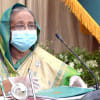No hasty projects in times of crisis

With the current government's term nearing its end, there has been a flurry of activity in various public departments of late. According to a report by Bonik Barta, as many as 82 projects are set to be tabled at a meeting of the Executive Committee of the National Economic Council (Ecnec) scheduled to be held on Tuesday. If everything goes as planned, this would be the highest number of proposals tabled at a single Ecnec meeting, says a Prothom Alo report. Apparently, government high-ups are seeing the meeting, likely the last before election, as a chance to get something substantial for their respective constituencies.
Most of these projects are for infrastructure development. There are some involving deadline extensions for existing projects. In the previous three Ecnec meetings, a total of 55 project proposals were tabled and approved. Insiders say the main goal here is to get the projects included in the Annual Development Programme (ADP) for the current fiscal year.
We must say we are not surprised by the rush in getting Ecnec approval for projects—a last-ditch attempt by MPs and ministers to gain some brownie points with voters. What we find concerning, however, are the number and, in some cases, budgets of these projects. Some of them are estimated to cost thousands of crores of taka. Is it prudent to take such financial stress at a time when the country is struggling with a raging inflation—9.63 percent, as of September 2023—and dwindling foreign exchange reserves?
Experts say we need to put unnecessary projects on hold to take some pressure off the ADP, not add to it. We cannot help but agree. Additional stress on ADP means these projects will not get enough allocations on time and, as a result, will be at risk of time and cost overruns leading to more challenges and irregularities.
Over the years, we have seen many instances of localised projects—bridges, hospital buildings, etc—implemented and abandoned, resulting in a huge waste of money. We cannot afford more of that now, when the country is going through an unprecedented economic crisis. What we need is for the government to make judicious decisions to ensure that the resources at our disposal are used optimally and prudently. That will surely do more to gain voters' favour.


 For all latest news, follow The Daily Star's Google News channel.
For all latest news, follow The Daily Star's Google News channel. 










Comments